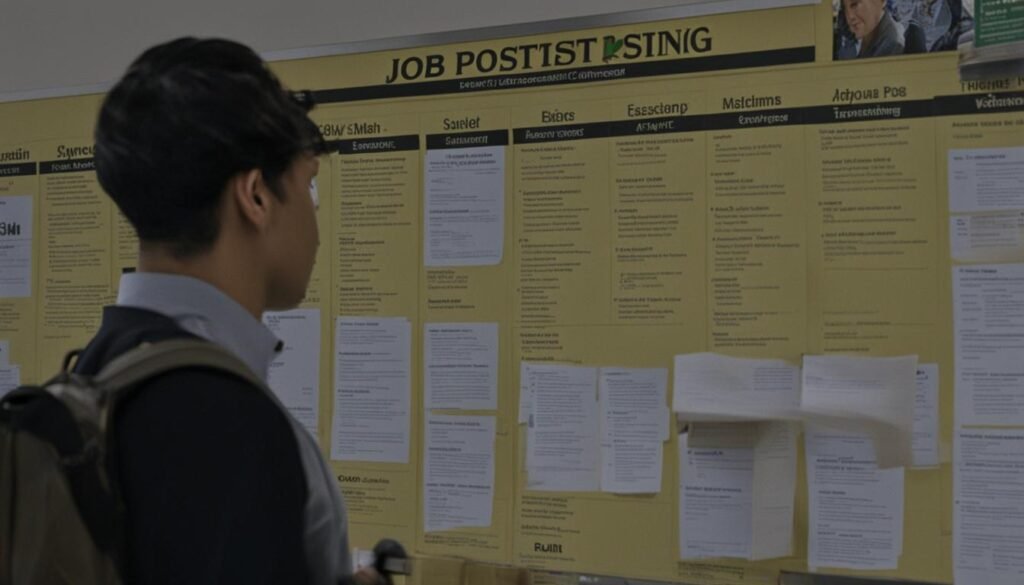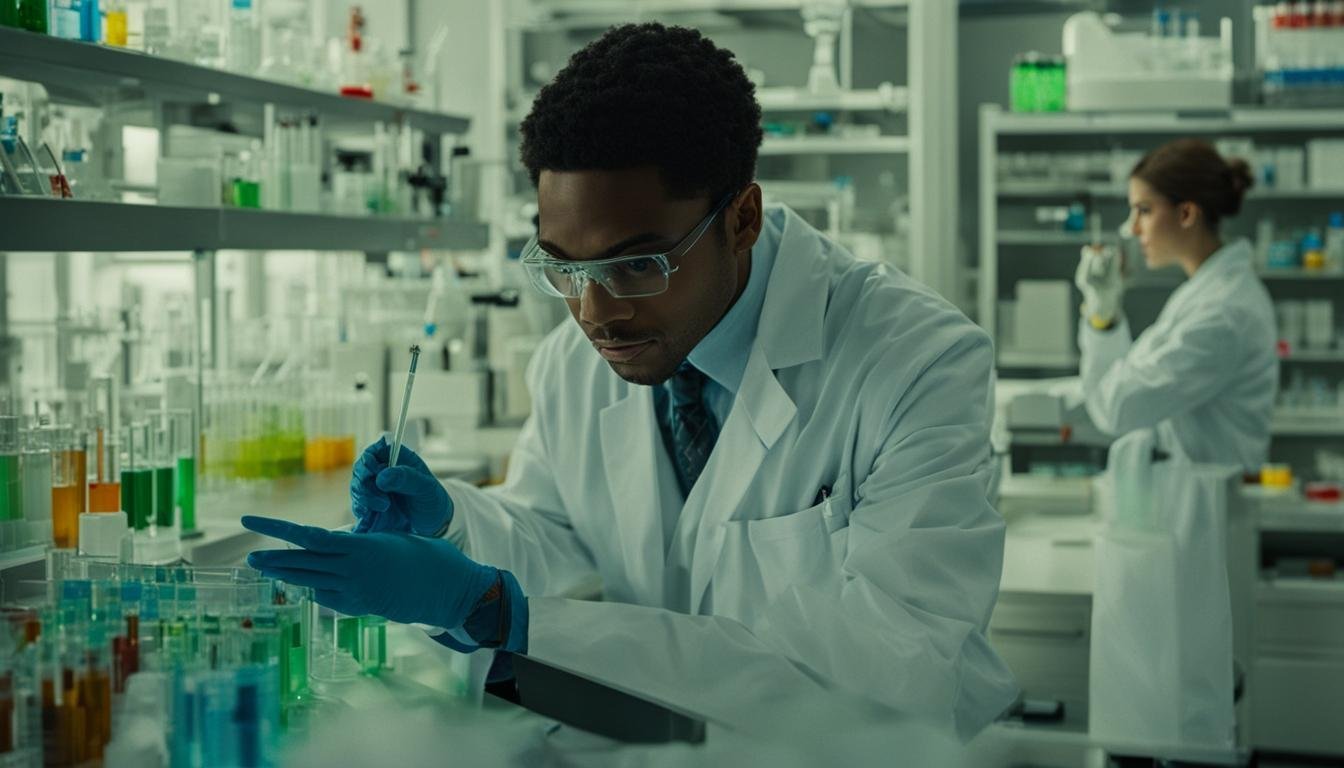Welcome to our comprehensive guide on becoming a laboratory assistant! If you have a passion for science and a desire to contribute to groundbreaking research, this is the perfect career path for you. In this guide, we will walk you through the steps to become a laboratory assistant, from acquiring essential lab skills to exploring entry-level job opportunities. Whether you have prior science knowledge or are starting from scratch, this guide will provide you with all the information you need to kickstart your career as a laboratory assistant. So, let’s dive in!
Key Takeaways:
- Becoming a laboratory assistant is an excellent entry point into the scientific field.
- Developing lab skills and acquiring scientific knowledge are essential for success in this role.
- Research experience can significantly enhance your prospects of becoming a laboratory assistant.
- There are numerous entry-level job opportunities available for aspiring laboratory assistants.
- Follow the steps outlined in this guide to unlock your potential and embark on a rewarding career as a laboratory assistant.
What Does a Medical Laboratory Assistant Do?

Medical laboratory assistants, also known as MLAs, play a crucial role in the laboratory professional team. Their responsibilities include processing clinical laboratory specimens, performing routine and specialized tests, preparing and staining slides for analysis, and performing phlebotomy. MLAs must be detail-oriented, have good communication skills, and work well in a team setting. Employers seek MLAs with good analytical judgment and the ability to work under pressure. MLAs work in hospitals, reference laboratories, and physician offices, and job opportunities in this field are expected to grow rapidly.
Lab assistant tasks may vary depending on the specific setting, but some common responsibilities include:
- Collecting and preparing samples for analysis
- Performing laboratory tests and procedures
- Operating and maintaining laboratory equipment
- Documenting and recording test results
- Ensuring proper handling and storage of specimens
Phlebotomy: A Key Skill for Medical Laboratory Assistants
Phlebotomy, the process of drawing blood from patients for testing or donation, is an essential skill for medical laboratory assistants. MLAs must be proficient in venipuncture techniques, ensuring the proper collection and labeling of blood samples. They must also follow safety protocols and maintain a sterile environment during the procedure. Phlebotomy is often performed using needles, so MLAs must have a steady hand and be able to calm anxious patients.
Testing and Specimen Processing
Medical laboratory assistants are responsible for performing various tests on clinical specimens, such as blood, urine, and tissue samples. They follow established protocols and use specialized equipment to analyze and interpret the results accurately. MLAs also play a critical role in specimen processing, ensuring proper labeling, storage, and disposal of samples. Attention to detail is paramount to maintain the integrity of the specimens and avoid errors in testing.
Education and Certification for Medical Laboratory Assistants
To pursue a career as a medical laboratory assistant, it is important to have the right education and certification. While some individuals may learn the necessary skills on the job, many employers prefer candidates who have completed a certificate or associate’s degree program in medical laboratory assistance. These programs are offered by accredited career/vocational schools, technical colleges, and community colleges.
Completing a formal education program provides a solid foundation of knowledge in laboratory procedures, safety protocols, and scientific principles. It also helps develop essential skills such as specimen handling, data analysis, and laboratory equipment operation. Additionally, these programs often include hands-on training in a clinical setting, allowing students to gain practical experience and apply their knowledge in real-world scenarios.
Obtaining certification as a medical laboratory assistant can further enhance job prospects in the field. Professional associations like the American Medical Technologists (AMT) offer certification programs for MLAs. These certifications validate an individual’s competency and expertise in the field and demonstrate their commitment to maintaining high professional standards. To become certified, candidates must meet specific eligibility requirements and pass a certification exam, which covers various aspects of laboratory procedures and practices.
By obtaining the right education and certification, aspiring medical laboratory assistants can position themselves for success in the field. Not only do these credentials provide employers with confidence in a candidate’s abilities, but they also open doors to new opportunities and advancement in the science and healthcare industry.
Advancement Opportunities for Medical Laboratory Assistants

Medical laboratory assistants have various opportunities for career advancement within the field. By pursuing additional education, gaining experience, and obtaining specialized certifications, MLAs can progress to higher-level positions and increase their earning potential.
H3: Lab Technologist
One possible path for advancement is becoming a lab technologist. Lab technologists perform more complex tests, analyze data, and interpret results. This role requires a bachelor’s degree in medical laboratory science or a related field. Lab technologists may specialize in areas such as hematology, microbiology, or immunology.
H3: Lab Supervisor and Lab Manager
MLAs with significant experience and leadership skills can advance to become lab supervisors or lab managers. In these roles, they oversee the daily operations of the laboratory, manage staff, ensure quality control, and implement laboratory policies and procedures.
H3: Specialized Certifications
Obtaining specialized certifications can also open doors for advancement. For example, MLAs can pursue certification as a phlebotomy technician, histotechnician, or medical laboratory scientist, depending on their area of interest and career goals. These certifications demonstrate expertise and competence in specific areas of laboratory medicine.
By taking advantage of these advancement opportunities, medical laboratory assistants can progress in their careers, increase their responsibilities, and contribute to the field of healthcare diagnostics.
Job Outlook and Salary for Medical Laboratory Assistants

The job outlook for medical laboratory assistants is highly promising, with excellent employment opportunities and a positive growth trajectory. According to the Bureau of Labor Statistics (BLS), the demand for laboratory workers, including medical laboratory assistants, is expected to grow faster than average between 2020 and 2030.
This positive job growth can be attributed to factors such as the increasing volume of laboratory tests and the development of new types of tests. As the healthcare industry continues to advance, the need for skilled laboratory personnel to conduct tests and analyze specimens will continue to rise.
The employment opportunities for medical laboratory assistants are expected to exceed the number of job seekers, making this career path highly competitive. This presents aspiring laboratory assistants with a wide range of job options and the potential for upward mobility.
In terms of salary, the average annual wage for medical laboratory assistants in 2019 was around $38,800. However, it’s important to note that salaries can vary based on factors such as the type of healthcare facility, geographical location, level of experience, and additional certifications or specialized skills.
With a positive job outlook and competitive salaries, pursuing a career as a medical laboratory assistant can be a rewarding choice for individuals interested in the scientific field and seeking entry-level healthcare positions.
Steps to Become a Medical Lab Assistant with No Experience

If you aspire to become a medical laboratory assistant but have no prior experience in the field, don’t worry! With the right steps, you can still embark on a successful career in this rewarding profession. Here are the key steps to follow:
- Educational Pursuits: Start by researching and enrolling in a suitable lab assistant education program. Look for accredited vocational schools, technical colleges, or community colleges that offer certificate or associate’s degree programs in medical laboratory assistance. These programs will provide you with the necessary knowledge and skills to excel in the field.
- Certification: While not always mandatory, obtaining certification as a medical laboratory assistant can significantly enhance your job prospects. Consider pursuing certification through reputable professional associations such as the American Medical Technologists (AMT). Meeting their eligibility requirements and passing their certification exam will demonstrate your dedication and competency to potential employers.
- Gain Hands-on Experience: During your education or after completing your program, seek opportunities for practical experience. Look for internships, externships, or entry-level positions in medical laboratories, hospitals, or other healthcare facilities. This hands-on experience will not only enhance your skills but also make you a more competitive candidate.
- Job Search Strategies: Craft a compelling resume and cover letter that highlight your education, certification, and any relevant experience or skills. Network with professionals in the field, attend job fairs, and explore online job portals specialized in healthcare careers. Stay proactive and consistent in your job search efforts.
By following these steps, you can overcome the lack of experience and position yourself as a strong candidate for medical laboratory assistant roles. Remember to stay curious, continuously learn and grow in your profession, and seize every opportunity to expand your knowledge and expertise.
Conclusion
Starting a career as a laboratory assistant with no experience is an achievable goal that can lead to exciting opportunities in the scientific field. By investing in the appropriate education and certification, you can position yourself for success in this entry-level healthcare job. Remember, dedication to professional development and staying updated on industry trends are key to unlocking the potential of your lab assistant career.
As you embark on this journey, keep in mind that the scientific field is constantly evolving. By continuously enhancing your skills and knowledge, you can stay ahead of the curve and make significant strides in your lab assistant career. Whether you choose to pursue additional education, gain experience, or specialize in a specific area, the possibilities for advancement are within reach.
With a growing demand for laboratory workers, the job outlook for medical laboratory assistants is promising. The scientific field offers a wide range of employment opportunities, and as you gain experience and expertise, you can explore various paths such as lab technologist, lab supervisor, or even roles in product development and marketing within medical and laboratory equipment companies.
So, if you have a passion for science and a desire to contribute to the healthcare industry, becoming a laboratory assistant is an excellent entry point. Start building your foundation by following the steps outlined in this guide, and open the door to a fulfilling career in the scientific field.
FAQ
What does a medical laboratory assistant do?
Medical laboratory assistants are responsible for processing clinical laboratory specimens, performing tests, preparing slides for analysis, and performing phlebotomy.
What education and certification do I need to become a medical laboratory assistant?
Many employers prefer candidates who have completed a certificate or associate’s degree program in medical laboratory assistance. Certification by a recognized professional association such as the American Medical Technologists (AMT) is also preferred.
What advancement opportunities are available for medical laboratory assistants?
With further education and experience, medical laboratory assistants can become lab technologists or lab technicians. They may also have opportunities to become lab supervisors or managers, or pursue roles in product development, marketing, and sales within medical and laboratory equipment companies.
What is the job outlook and salary for medical laboratory assistants?
Employment of medical laboratory assistants is expected to grow faster than average, and job opportunities are expected to be excellent. The average annual wage for medical laboratory assistants in 2019 was around $38,800.
How can I become a medical laboratory assistant with no experience?
To become a medical laboratory assistant with no experience, you can start by completing a certificate or associate’s degree program in medical laboratory assistance. It is also beneficial to obtain certification from a recognized professional association. Additionally, gaining further education and experience can help you advance in your career.
Source Links
- https://americanmedtech.org/Blog/Blog-Post/how-to-become-a-medical-laboratory-assistant
- https://www.nysed.gov/career-technical-education/medical-laboratory-technology
- https://www.medicaltechnologyschools.com/medical-lab-assistant/how-to-become-a-medical-lab-assistant


